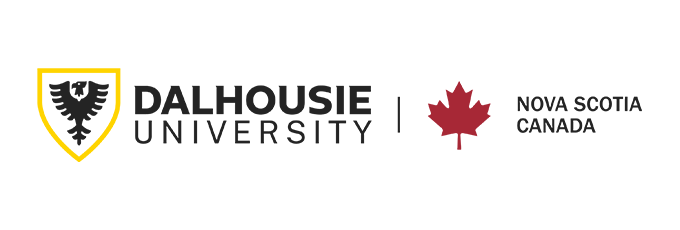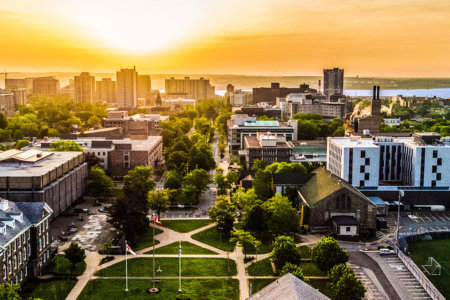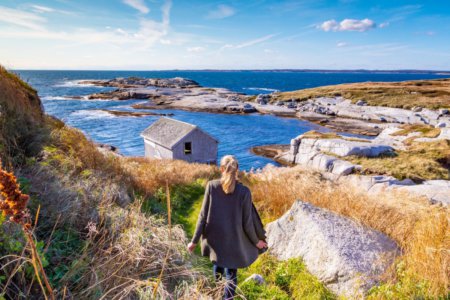When Shivam Chauhan was researching ways to advance his love for physics and math, he knew it had to include a study abroad experience. He wanted to discover new places, gain independence and broaden his horizons. Canada was the perfect country to do it, specifically because it was home to Dalhousie University.
“I found Dalhousie University to be most affordable while meeting most of my criteria — being one of the best in its region, having a great engineering programme with its own designated campus, and hosting an abundance of extracurriculars,” he says. “Furthermore, Halifax is one of the fastest-growing cities with one of the warmest winters in Canada — certainly a must for someone who is accustomed to Indian temperatures.”
More than this, Dalhousie University is a globally renowned institution known for combining innovative research with meaningful teaching and a deep sense of social responsibility. This combination inspires a connected community of learners to make a difference in Nova Scotia, across Canada and around the world.
The journey begins with academic programmes that are filled with interdisciplinary perspectives and are focused on service while drawing from a drive for discovery that results in US$194 million in research funding each year. Dalhousie is Atlantic Canada’s primary research-intensive university. It is also a member of the U15 Group of Canadian Universities, with world-leading research and innovation including labs, studios and fieldwork.
The engineering programme Chauhan speaks of is one of the university’s most dynamic and a strong testament to its reputation for academic prowess. The Bachelor of Engineering in Industrial Engineering teaches students to design solutions to improve the performance of complex systems of people, technology and information. All lessons are conducted in small classrooms to ensure personalised attention and optimum retention.

The Studley campus is Dalhousie’s largest Halifax campus and home to many key buildings and resources. Source: Dalhousie University
The programme is delivered from the purpose-built Sexton Campus, which houses the Faculty of Engineering and Faculty of Architecture and Planning in Halifax’s downtown core. Ensuring certain communities gain access to resources and support tailored to their interests is a priority at Dalhousie. This way, international students are able to fully immerse themselves in their lessons while enjoying inclusive offerings specifically designed for a diverse student body.
“At Dalhousie University, we celebrate culture,” says Chauhan. “Our Dalhousie International Students Association, Together@Dal programme, and so many different international societies always have something to offer to international students whether it be support or cultural events. For example, we celebrate Diwali, Navaratri, Holi, and Uttarayan in Halifax just like we did in India.”
Engaged and inspired, Chauhan took on the role of International Students Representative. He gives fresh ideas and provides a voice to the more than 115 nationalities that make up the university’s 20,000-strong student body.
“We even have a Dalhousie Indian Students Association, Dalhousie Hindu Students Association, Dalhousie Gujarati Students Association, and hundreds of other student societies open for registration,” says Chauhan. “Students are also encouraged to form their own societies. These societies organise events for students while providing support in a myriad of different ways.”

Chauhan, a third-year student, is also a part-time Teaching Assistant and Vice President of External Affairs for the Dalhousie Undergraduate Engineering Society. Source: Dalhousie University
All are welcome to discover new passions. Dalhousie’s expansive lineup of clubs and societies include the Dalhousie Outdoors Society, Dalhousie Kayaking Society, Dalhousie Sailing Team, Dalhousie Fencing Club, Dalhousie Football Club and Dalhousie Cheerleading.
It’s little wonder why Chauhan believes his time here has been a fruitful “balance of studying and fun”. “Dalhousie values extracurricular participation, not just studying,” he says. “The university has provided me with unimaginable opportunities to grow and develop.”
A fair bit of this growth takes place beyond campus, where scenic surroundings calm minds and expose them to new possibilities. The university is located in Nova Scotia, Canada, on Mi’kma’ki ancestral land. It comprises four campuses in Halifax and Truro, with satellite locations in Yarmouth and Saint John, New Brunswick. Nova Scotia itself sits at the far eastern end of Canada’s coastline, boasting an atmospheric landscape occupied by friendly locals with Celtic roots.
While this bit of North America gives off more of an Irish or Scottish feel, elements of the rest of the world can be found across Canada — making Dalhousie University the ultimate destination for anyone keen on exploring on the weekends after a fulfilling week of academic enrichment.
Follow Dalhousie University on Facebook, Twitter, YouTube, Instagram and LinkedIn.













